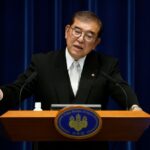According to the latest reports, at 6:00 PM local time on September 7, Japanese Prime Minister Shigeru Ishiba held a press conference at the Prime Minister’s Official Residence, formally announcing his resignation from the post of Prime Minister. He cited the reason as “hoping to prevent a split within the ruling Liberal Democratic Party.”
One year prior, following a fierce contest, Shigeru Ishiba was propelled to the forefront by pledges of political reform, realizing his four-decade-long ambition to govern. His tenure began amid expectations for a reckoning with the LDP’s “black money politics” and concluded with an accounting for his own failed administration.
The Isolated and Helpless Prime Minister
Before winning the LDP leadership election, Shigeru Ishiba published his autobiography, Conservative Statesman: My Policies, My Destiny. In the book, he recounted his long-standing image as a marginal figure in Japanese politics, writing: “If someone like me were to become prime minister, it would be a time of deadlock for the LDP and the nation—something impossible without divine mandate.”
From the outset, he was a prime minister without allies, a reluctant compromise among factions within the party to block Sanae Takaichi from ascending to power. Ultimately, he resigned citing the need to “avoid a decisive split within the party,” though in reality, it was the result of being abandoned by party forces.
The devastating defeat in the July House of Councillors election served as the trigger, compounded by earlier losses in the House of Representatives and Tokyo Metropolitan Assembly elections, leaving the ruling coalition in the minority in both chambers. Yet after the electoral defeats, Shigeru Ishiba did not immediately step down. Instead, he delayed his resignation by citing the Japan-U.S. tariff negotiations, attempting to cling to power—a move widely seen as an obsession with holding onto authority. Prolonged internal party struggles stalled budget deliberations and price stabilization measures, plunging the political landscape into chaos and a vacuum.
Undeniably, Shigeru Ishiba suffered from low popularity within the party, lacking stable support and a core team. Even leaders of the old factions kept their distance, leaving his leadership perpetually weak. After the election defeat, he was increasingly seen as a sacrificial pawn. At his resignation, he choked up while acknowledging his failure to complete political reforms and restore public trust. He stated that the path to regional revitalization remained “long and arduous,” leaving behind unfinished business.
The Collapse of an Image of Integrity
The greatest paradox of Shigeru Ishiba’s tenure lies in this: while his party demanded his resignation following the Upper House election defeat, he still topped public opinion polls with around 20% support. This phenomenon reflects the dual logic of Japanese politics: within the party, his electoral failure stripped him of core value, making him a liability in lawmakers’ eyes. Among the public, however, his “non-mainstream” image and reputation for “speaking his mind” positioned him as the “least bad option” in a political landscape lacking viable alternatives. Yet after losing his majority, his ability to steer parliamentary operations became severely constrained, forcing policy compromises with opposition parties and preventing him from truly showcasing his distinctive “Ishiba style.” In a political landscape lacking viable alternatives, he is seen as the “least bad choice.” However, after the LDP lost its majority, his ability to navigate the Diet became severely constrained. He was forced to compromise with opposition parties on policy, making it difficult to showcase his true “Ishiba style.”
Yet the “integrity capital” underpinning his image ultimately collapsed. In May this year, Shukan Bunshun—a magazine notorious for exposing political scandals—revealed that over a decade, he had accepted over 30 million yen in illegal donations from a Tokyo real estate company while maintaining close personal ties with its chairman. Evidence of the payments even came from a list submitted by the chairman’s son during a financial dispute. Although Ishihara denied the report and claimed the accounts showed no such entries, under the Political Funds Control Act, such large unreported donations constitute “black money,” severely undermining his political foundation.
The Post-Shigeru-Hashi Era
Shigeru Ishiba’s swift downfall exposed the hypocrisy of the LDP’s “faction dissolution.” In June, five major factions were forced to disband due to scandals, but this was essentially just a legal deregistration. The logic of money and position allocation persists, with old members continuing their activities through policy groups or small circles, while newcomers are forming fresh factions. Ishiba, lacking factional backing, was thrust into leadership amid the chaos but ultimately collapsed in isolation during the crisis. Now, Toshimitsu Motegi has taken the lead in announcing his candidacy for party president, igniting the succession battle. Yet the LDP in the “post-Ishiba era” has not completed its reforms. Instead, it may repeat past mistakes under old thinking, continuing to flounder amid the challenges of minority government and societal distrust.










